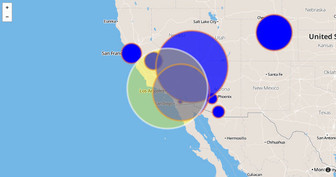Government Grants
Business Grants
Home Owner Programs
Federal Programs
About Us
Family Connection Grants
- Building the Evidence for Family Group Decision-Making in Child Welfare
- Family Connection Grants: Combination Family-finding/Family Group Decision-making Projects
- Family Connection Grants: Comprehensive Residential Family Treatment Projects
- Family Connection Grants: Child Welfare/TANF Collaboration in Kinship Navigation Programs
- Family Connection Grants: Using Family Group Decision-making to Build Protective Factors for Children and Families
The Department of Health and Human Services is the Federal government's principal agency for protecting the health of all Americans and providing essential human services, especially to those who are least able to help themselves.
Program Accomplishments
None. New program for FY 2009.
Uses and Use Restrictions
Grants are provided for services or activities that are consistent with the purpose of section 102, Public Law 110-351, and may include the following: (1) a kinship navigator program to assist kinship caregivers in learning about, finding and using programs and services to meet the needs of the children they are raising and their own needs, and to promote effective partnerships among public and private agencies to ensure kinship caregiver families are served; (2) intensive family-finding efforts that utilize search technology to find biological family members for children in the child welfare system; (3) family group decision-making meetings for children in the child welfare system that enable families to make decisions and develop plans that nurture children and protect them from abuse and neglect; and (4) residential family treatment program that enable parent and their children to live in a safe environment for a period of not less than 6 months.
Eligibility Requirements
Applicant Eligibility
State, local or tribal child welfare agencies and private nonprofit organizations that have experience in working with foster children or children in kinship care arrangements.
Beneficiary Eligibility
Public or private nonprofit agencies or organizations or tribal child welfare agencies working with foster children or children in kinship care arrangements or children at risk of entering foster care that help the children reconnect with family members.
Credentials/Documentation
Nonprofit agencies must submit proof of nonprofit status. Applicable costs and administrative procedures will be determined in accordance with Parts 74 and 92 of Title 45 of the Code of Federal Regulations.
Aplication and Award Process
Preapplication Coordination
Standard application forms as furnished by HHS must be used for this program.
This program is excluded from coverage under E.O.
12372.
Application Procedures
Announcement of availability of funds is posted to www.Grants.gov. Eligible applicants submit applications by specified deadlines.
Award Procedures
Grant applications are reviewed by a panel of non-federal professionals with expertise in the field of child welfare, particularly foster and kinship care.
Deadlines
The deadline for the receipt of applications is stated in the Program Announcement.
Authorization
Fostering Connections to Success and Increasing Adoptions Act of 2008, Public Law 110-351.
Range of Approval/Disapproval Time
From 3 to 6 months.
Appeals
Appeals are processed in accordance with HHS regulations in 45 CFR Part 16.
Renewals
Projects are awarded with a provision for non-competitive renewal during the approved award period (one to three years).
Assistance Considerations
Formula and Matching Requirements
The required match must increase over the course of the grant period, such that grantees must contribute 25 percent of the program costs for the first and second year of the grant and 50 percent of the program costs for the third year of the three year grant. (Section 427(d) of the Social Security Act).
Length and Time Phasing of Assistance
Grants are available for not less than one year and not more than three years. Renewal funding for multiple-year grants is dependent upon grantee performance and availability of funds.
Post Assistance Requirements
Reports
Financial and program reports are required semiannually with a final report at completion of the project.
In addition, grants must select and track performance indictors that measure the extent to which grant-funded activities and services enhance the safety, permanency and well-being of children and their families.
Audits
Audits are conducted in accordance with requirements in 45 CFR 74 and 92.
Records
All financial records are to be maintained for 3 years after termination of the project or until audit is completed, whichever comes first.
Financial Information
Account Identification
75-1512-0-1-609.
Obigations
FY 07 $0; FY 08 $0; FY 09 $15,000,000. (Note: The funds in this program are also available for contracts. The amounts for contracts cannot be predetermined.)
Range and Average of Financial Assistance
Up to $400,000 per grant.
Regulations, Guidelines, and Literature
Specific program requirements are contained in the Funding Opportunity Announcement, the application instructions, and the HHS Grants Policy Statement. The HHS Grants Policy Statement can be found at: http://www.hhs.gov/grantsnet/.
Information Contacts
Regional or Local Office
None.
Headquarters Office
Patricia Campiglia, Federal Project Officer, Division of Research and Innovation, Children's Bureau, 1250 Maryland Avenue, S.W., 8th Floor, Washington, DC 20024; Telephone: (202) 205-8060; Cathy Overbagh, Federal Project Officer, Division of Research and Innovation, Children's Bureau, 1250 Maryland Avenue, S.W., 8th Floor, Washington, DC 20024; Telephone: (202)205-7273.
Criteria for Selecting Proposals
Applications are evaluated on the basis of the degree to which proposals meet specific objectives defined in the program announcement including, but not limited to: (1) organizational capacity to collaborate with other service providers; (2) relevance of proposed services and activities in enhancing the well-being of children in foster care, in kinship care arrangements, or at risk of foster care and in helping the children reconnect with family members; and (3) demonstrated ability to conduct a kinship navigator program; provide intensive family-finding efforts that utilize search technology; conduct family group-decision making efforts and provide residential family treatment programs.
Social Entrepreneurship
Spotlight
When it Comes to Social Enterprises, Failure is the Best Platform for Innovation

In the world of social enterprises, failure is a cringe-worthy moment nobody wants to talk about. But, social entrepreneurs can benefit from their failures.

